On 7th July, it was announced that the syllabus for the Central Board of Secondary Education (CBSE) classes IX to XII was ‘rationalized’. The Union Minister of Human Resources Development Ramesh Nishank Pokriyal tweeted about it. A major reduction in the syllabus comes in continuation of the slight reduction in the syllabus that was undertaken in April 2020. The CBSE and also HRD Ministry claimed that the curriculum rationalization was aimed to reduce the syllabus load by almost 30 percent so as to ease the exam stress amongst students and prevent the gaps in expected and achieved learning outcomes.
While it is easy to misconstrue exclusion of 3-4 topics like nationalism, local government, federalism, etc. and build a concocted narrative, a wider perusal of different subjects will show that this exclusion is happening across subjects.
— Dr. Ramesh Pokhriyal Nishank (@DrRPNishank) July 9, 2020
On the decision of the curriculum rationalization, Ramesh Pokhariyal in his tweets noted that suggestions were invited from all educationists and at least 1500 suggestions on how to reduce the burden on students. However,
?Considering the importance of learning achievement, it has been decided to rationalize syllabus up to 30% by retaining the core concepts.@PMOIndia @HMOIndia @HRDMinistry @mygovindia @transformIndia @cbseindia29 @mygovindia
— Dr. Ramesh Pokhriyal Nishank (@DrRPNishank) July 7, 2020
However, the move was deeply criticized by many including educationists, activists, political leaders across political and ideological spectrums. The chapters that were dropped in the name of the curriculum rationalization are understood to make up the core values that the education system must carefully engage with. The complete chapters on certain important topics were omitted.
Read: Why Right to Education activists oppose the World Bank-funded STARS program
According to the updated curriculum, the chapters deleted from the Class 10 syllabus are those dealing with democracy and diversity, gender, religion and caste, popular struggles and movement and challenges to democracy.
For Class 11, the deleted portions include the chapters on federalism, citizenship, nationalism, secularism and growth of local governments in India.
The curriculum for Class 11 students included chapters on Peasants, Zamindars and the State, Understanding Partition, and sections on ‘Revolt in The Countryside’ which were based on farmers’ agitation against moneylenders, have been removed. Additionally, topics including Federalism, the need for Local Governments, Growth of Local Government in India, which fall under a section titled Indian Constitution at Work, have been removed from the subject of Political Science in Class 11. In the subject of Sociology, chapters on Social Structure, Stratification and Social Processes, and Environment and Society have been removed for Class 11.
Similarly, Class 12 students will not be required to study the chapters on India’s relations with its neighbours — Pakistan, Myanmar, Bangladesh, Sri Lanka and Nepal, the changing nature of India’s economic development, social movements in India and demonetisation, among others.
Response to the move
The move is understood and alleged to be yet another attempt to Saffronize Education in the country by the ruling BJP regime. The ideas of federalism, democratic rights, environment, nationalism, and secularism that form the core of the functioning of a Democracy. These chapters being sacked from the curriculum is seen as a part of the larger attack on democracy by the BJP Government and its parental organization RSS. Many leaders have objected to this move by the Central government.
The Modi govt is losing no opportunity to squeeze Indians in this health crisis. No effort to boost public healthcare. Instead, more taxes on the poor hiking fuel prices, deepening economic decline, states not getting their share and altering syllabus to kill reason & thinking. pic.twitter.com/ZsdyWJ20MN
— Sitaram Yechury (@SitaramYechury) July 9, 2020
Chapters on Citizenship, Secularism & Federalism are dropped from Class 11 Pol Sc. syllabus.
Does this explain something?
Yes, it explains that @BJP4India doesn't believe in these principles & validates its past behaviour.#StopSaffronisationOfEducation
1/2
— Siddaramaiah (@siddaramaiah) July 9, 2020
Imp subjects like Citizenship,Nationalism & Secularism are no more part of class Xl CBSE curriculum.
Moving inch by inch towards majoritarianism ……..
# SaffronisingEducation
— Dr Syed Naseer Hussain-MP, Rajya Sabha (@NasirHussainINC) July 8, 2020
However, in response to the various criticisms, it was met with, the CBSE has issued a clarification statement that syllabus reduction is only for the purposes of the examination only in the academic year 2020-21. It has also added that for the purposes of teaching-learning processes, the Alternative Academic Calendar is being followed in which none of the chapters have been omitted.
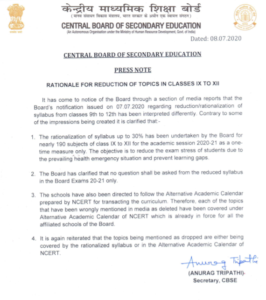
Here’s what the HRD ministry has to say on the reduced CBSE syllabus
According to Human Resource Development (HRD) Ministry officials, the syllabus has been rationalised to reduce the burden on students but the core concepts have been retained.
“The loss of instructional time for a proportionate reduction in the curriculum load for exams was assessed. Accordingly, the course committee of the board had initiated the work on the reduced syllabus. Suggestions were invited from various stakeholders.
“Heads of schools and teachers have been advised by the board to ensure that the topics that have been reduced are explained to the students to the extent required. However, the reduced syllabus will not be part of the topics for the internal assessment and the year-end board examination,” a senior CBSE official said.
Below is the detailed list of chapters that were removed from the curriculum of class 9th to 12th.
Deleted Social studies syllabus for CBSE class 9
UNIT 1: INDIA AND THE CONTEMPORARY WORLD – I (HISTORY)
Forest Society and Colonialism
Pastoralists in the Modern World
UNIT 2: CONTEMPORARY INDIA – 1 (GEOGRAPHY)
Chapter 3: Drainage Complete Chapter except for Map items which will be assessed in the Examination
Chapter 6: Population Complete Chapter
UNIT 3: DEMOCRATIC POLITICS – I (POLITICAL SCIENCE)
Chapter 2: Constitutional Design Democratic Constitution in South Africa (Only)
Chapter 5: Democratic Rights Complete Chapter
UNIT 4: ECONOMICS
Chapter 4: Food Security in India Complete Chapter
CBSE Class 10
Recommended portion for deletion in Social studies syllabus for CBSE class 10
UNIT 1: INDIA AND THE CONTEMPORARY WORLD –II (HISTORY)
Section 2 : Livelihoods, Economies and Societies: The chosen Chapter to be assessed in the Periodic Tests and not in Board Examination.
Section 3: Everyday Life, Culture and Politics; Chapter 5: Print Culture and the Modern World
UNIT 2: CONTEMPORARY INDIA – II (GEOGRAPHY)
Chapter 2: Forest and Wildlife Complete Chapter
Chapter 3: Water Resources Complete Chapter except for Map Items which will be assessed in the Examination
Chapter 5: Mineral and Energy Resources Complete Chapter except for Map Items which will be assessed in the Examination
UNIT 3: DEMOCRATIC POLITICS –II (POLITICAL SCIENCE)
Chapter 3: Democracy and Diversity Complete Chapter
Chapter 4: Gender, Religion and Caste Complete Chapter
Chapter 5: Popular Struggles and Movements Complete Chapter
Chapter 8: Challenges to Democracy Complete Chapter
CBSE Class 11
Deleted Economics syllabus for class 11
Part A: Statistics for Economics
Unit 3: Statistical Tools and Interpretation: Measures of Dispersion – (range, quartile deviation, mean deviation and); (co-efficient of range, co-efficient of quartile-deviation, coefficient of mean deviation,
Correlation –Spearman’s rank correlation.
Index Numbers – index of industrial production
Part B: Introductory Microeconomics
Unit 4: Introduction concepts of production possibility frontier
Unit 6: Producer Behaviour and Supply: Producer’s equilibrium-meaning and its conditions in terms of marginal revenue-marginal cost.
Unit 7: Forms of Market and Price Determination under Perfect Competition with simple applications: Other Market Forms – monopoly, monopolistic competition – their meaning and features.
Deleted English Elective syllabus for class 11
WRITING REPORT WRITING
LITERATURE GLORY OF TWILIGHT
LITERATURE THE LUNCHEON
LITERATURE FOR ELKANA
LITERATURE REFUGEE BLUES
LITERATURE FELLING OF THE BANYAN TREE
LITERATURE AJAMIL AND THE TIGERS
Deleted History syllabus for class 11
THEMES IN WORLD HISTORY
Early Societies (Theme-1): Complete Chapter
Nomadic Empires (Theme-5): Complete Chapter
Confrontation of Cultures (Theme-8): Complete Chapter
Deleted Political Science syllabus for class 11
Book I: Indian Constitution at Work
TOPICS
Federalism (Completely Deleted)
Local Governments
These topics are deleted from this unit: Why do we need Local Governments?; Growth of Local Government in India
Book II: Political Theory
Citizenship (Completely Deleted)
Nationalism (Completely Deleted)
Secularism (Completely Deleted)
CBSE Class 12
Deleted Economics syllabus for class 12
Part A: Introductory Macroeconomics
Unit 2: Money and Banking: Control of Credit through Bank Rate, CRR, SLR, Repo Rate and Reverse Repo Rate, Open Market Operations, Margin requirement
Unit 5: Balance of Payments: Balance of payments deficit-meaning; Determination of exchange rate in a free market
Part B: Indian Economic Development
Current challenges facing Indian Economy: Growth of Education Sector in India; alternative farming – organic farming; Infrastructure: Energy
Deleted English Elective syllabus for class 12
Literature-Short Story
1. Tomorrow
2. One cm.
Literature- Poetry
1. Blood
Literature – Non Fiction
1. Science Fiction
2. Argumentative Indian
Literature – Drama
1. Broken Images
Deleted History syllabus for CBSE class 12
Through the Eyes of Travellers (Theme-5) Part-II: Complete Chapter
Peasants, Zamindars And the State: Part-II – Complete Chapter
Colonialism and The Countryside: Part-III — A Revolt in The Countryside -The Bombay Deccan (Uniit-3), The Deccan Riots
Colonial Cities: Part-III – Complete Chapter
Understanding Partition: Part-III –— Complete Chapter
Deleted Political Science syllabus for class 12
Book I: Contemporary World Politics
Security in the Contemporary World (Completely Deleted)
Environment and Natural Resources (Completely Deleted)
Book II: Politics in India since Independence
Planned Development
These topics are deleted from this unit:
Changing nature of India’s economic development
Planning Commission and Five-year Plans
India’s Foreign Policy
These topics are deleted from this unit:
India’s Relations with its Neighbour’s: Pakistan, Bangladesh, Nepal, Sri Lanka and Myanmar.
Social and New Social Movements in India (Completely Deleted)
15 Regional Aspirations (Completely Deleted)

















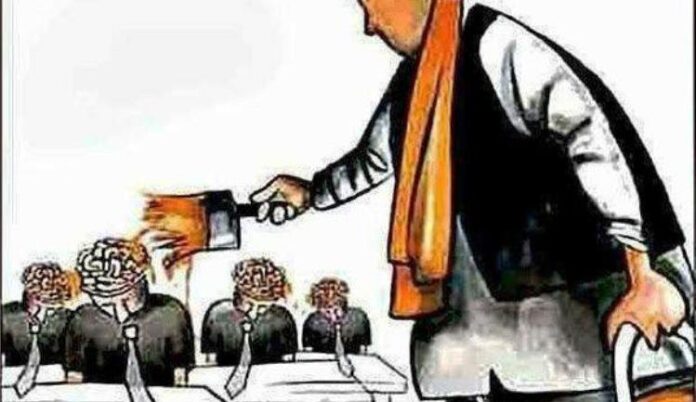
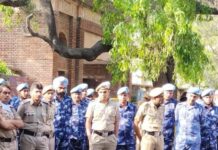

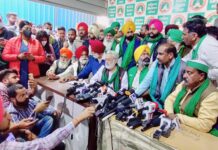






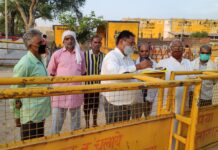
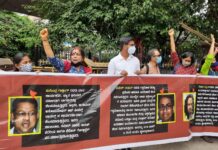


[…] Also read: Is CBSE’s Curriculum “Rationalizaion” an attempt to Saffronize Education? […]